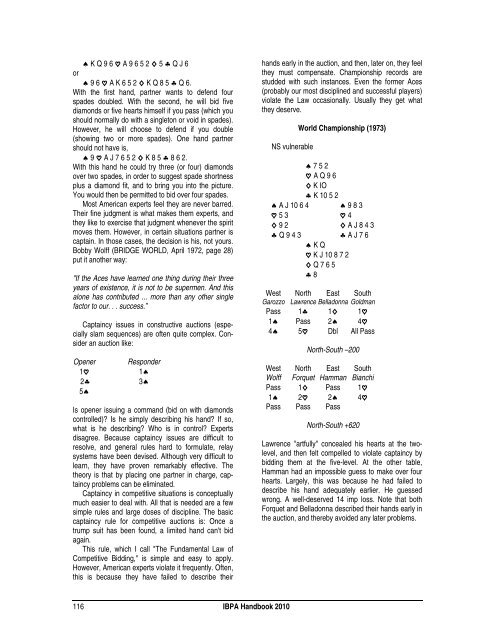Handbook - International Bridge Press Association
Handbook - International Bridge Press Association
Handbook - International Bridge Press Association
You also want an ePaper? Increase the reach of your titles
YUMPU automatically turns print PDFs into web optimized ePapers that Google loves.
♠ K Q 9 6 A 9 6 5 2 5 ♣ Q J 6<br />
or<br />
♠ 9 6 A K 6 5 2 K Q 8 5 ♣ Q 6.<br />
With the first hand, partner wants to defend four<br />
spades doubled. With the second, he will bid five<br />
diamonds or five hearts himself if you pass (which you<br />
should normally do with a singleton or void in spades).<br />
However, he will choose to defend if you double<br />
(showing two or more spades). One hand partner<br />
should not have is,<br />
♠ 9 A J 7 6 5 2 K 8 5 ♣ 8 6 2.<br />
With this hand he could try three (or four) diamonds<br />
over two spades, in order to suggest spade shortness<br />
plus a diamond fit, and to bring you into the picture.<br />
You would then be permitted to bid over four spades.<br />
Most American experts feel they are never barred.<br />
Their fine judgment is what makes them experts, and<br />
they like to exercise that judgment whenever the spirit<br />
moves them. However, in certain situations partner is<br />
captain. In those cases, the decision is his, not yours.<br />
Bobby Wolff (BRIDGE WORLD, April 1972, page 28)<br />
put it another way:<br />
"If the Aces have learned one thing during their three<br />
years of existence, it is not to be supermen. And this<br />
alone has contributed ... more than any other single<br />
factor to our. . . success.”<br />
Captaincy issues in constructive auctions (especially<br />
slam sequences) are often quite complex. Consider<br />
an auction like:<br />
Opener Responder<br />
1 1♠<br />
2♣ 3♠<br />
5♠<br />
Is opener issuing a command (bid on with diamonds<br />
controlled)? Is he simply describing his hand? If so,<br />
what is he describing? Who is in control? Experts<br />
disagree. Because captaincy issues are difficult to<br />
resolve, and general rules hard to formulate, relay<br />
systems have been devised. Although very difficult to<br />
learn, they have proven remarkably effective. The<br />
theory is that by placing one partner in charge, captaincy<br />
problems can be eliminated.<br />
Captaincy in competitive situations is conceptually<br />
much easier to deal with. All that is needed are a few<br />
simple rules and large doses of discipline. The basic<br />
captaincy rule for competitive auctions is: Once a<br />
trump suit has been found, a limited hand can't bid<br />
again.<br />
This rule, which I call "The Fundamental Law of<br />
Competitive Bidding," is simple and easy to apply.<br />
However, American experts violate it frequently. Often,<br />
this is because they have failed to describe their<br />
116 IBPA <strong>Handbook</strong> 2010<br />
hands early in the auction, and then, later on, they feel<br />
they must compensate. Championship records are<br />
studded with such instances. Even the former Aces<br />
(probably our most disciplined and successful players)<br />
violate the Law occasionally. Usually they get what<br />
they deserve.<br />
NS vulnerable<br />
World Championship (1973)<br />
♠ 7 5 2<br />
A Q 9 6<br />
K IO<br />
♣ K 10 5 2<br />
♠ A J 10 6 4 ♠ 9 8 3<br />
5 3 4<br />
9 2 A J 8 4 3<br />
♣ Q 9 4 3 ♣ A J 7 6<br />
♠ K Q<br />
K J 10 8 7 2<br />
Q 7 6 5<br />
♣ 8<br />
West North East South<br />
Garozzo Lawrence Belladonna Goldman<br />
Pass 1♣ 1 1<br />
1♠ Pass 2♠ 4<br />
4♠ 5 Dbl All Pass<br />
North-South –200<br />
West North East South<br />
Wolff Forquet Hamman Bianchi<br />
Pass 1 Pass 1<br />
1♠ 2 2♠ 4<br />
Pass Pass Pass<br />
North-South +620<br />
Lawrence "artfully" concealed his hearts at the twolevel,<br />
and then felt compelled to violate captaincy by<br />
bidding them at the five-level. At the other table,<br />
Hamman had an impossible guess to make over four<br />
hearts. Largely, this was because he had failed to<br />
describe his hand adequately earlier. He guessed<br />
wrong. A well-deserved 14 imp loss. Note that both<br />
Forquet and Belladonna described their hands early in<br />
the auction, and thereby avoided any later problems.


